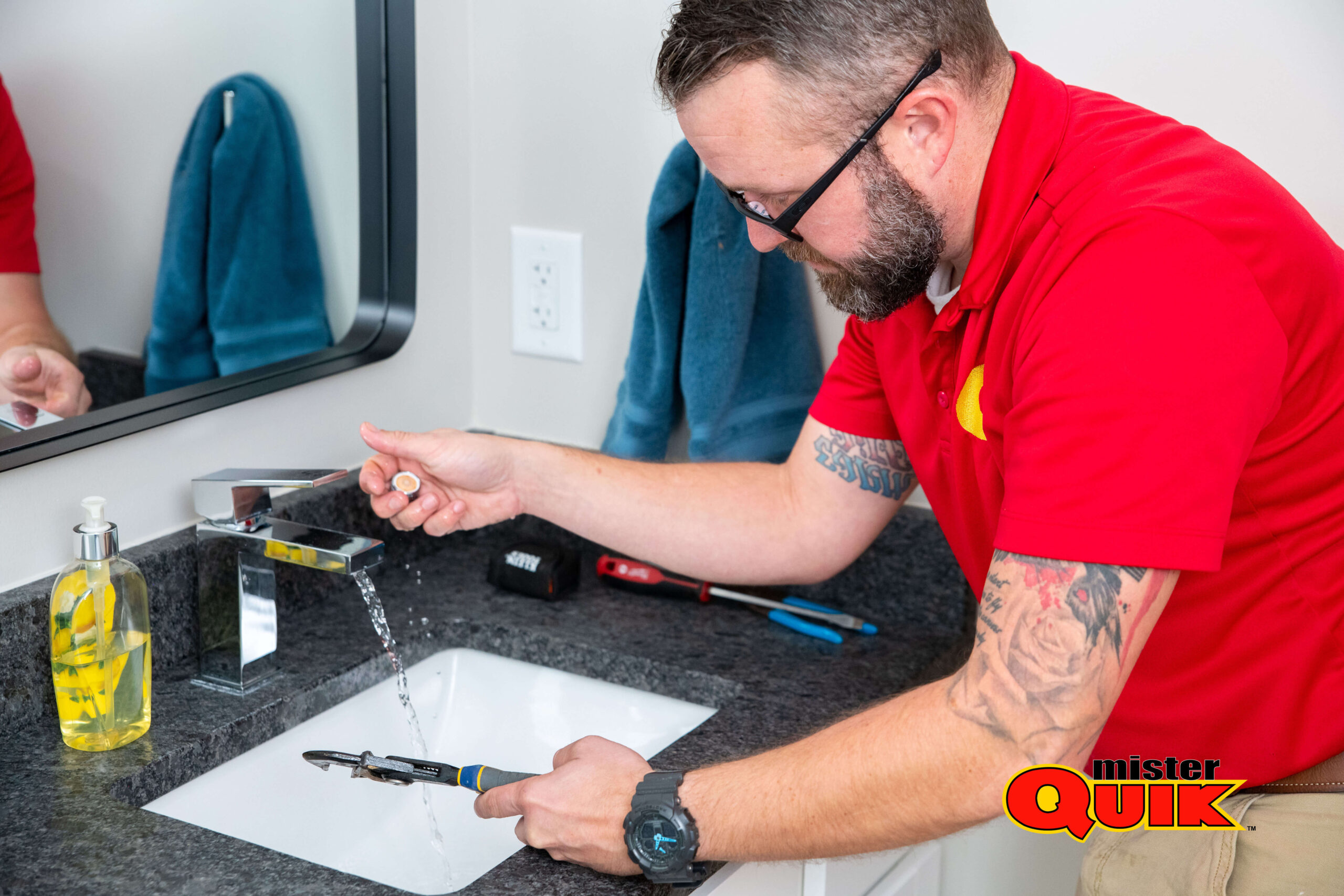Indianapolis Bacteria Filters

Types of water filters for home
Concerned about your Indianapolis home’s water quality? Water filters offer a solution to improve your drinking water and address various concerns. But with numerous options available, choosing the right one can feel overwhelming. Here’s a breakdown of common types of water filters to help you decide:
- Activated Carbon Filters:
- Function: Removes chlorine, taste, odor, and some organic contaminants.
- Benefits: Affordable, effective for basic taste and odor improvement.
- Limitations: Doesn’t remove all contaminants like bacteria or minerals.
- Reverse Osmosis (RO) Systems:
- Function: Removes a wide range of contaminants, including bacteria, minerals, and heavy metals.
- Benefits: Provides highly filtered, almost bottled-water quality.
- Limitations: Requires installation, can waste water during filtration, may not be necessary for all Indianapolis homes.
- Distillation Filters:
- Function: Boils water to remove virtually all contaminants, including bacteria and minerals.
- Benefits: Effective for complete contaminant removal.
- Limitations: Slow filtration process, uses significant energy, alters taste of water.
- Ultraviolet (UV) Filters:
- Function: Specifically targets and inactivates bacteria and viruses present in water.
- Benefits: Effective for bacterial disinfection, often used in conjunction with other filters.
- Limitations: Doesn’t remove other contaminants like chlorine or minerals.
- Indianapolis Bacteria Filters:
- Function: Specifically address bacterial concerns in your Indianapolis water supply.
- Benefits: Offer targeted protection against harmful bacteria, often portable and easy to use.
- Limitations: May not remove other contaminants like chlorine or minerals, consult a professional to determine if necessary based on your water testing results.
Water filter for bacteria and viruses
Ensuring your drinking water is free from harmful bacteria and viruses is crucial for your health and well-being. While most municipal water supplies in Indianapolis are treated to remove these contaminants, additional concerns can arise due to aging infrastructure, private wells, or specific health vulnerabilities. This is where Indianapolis bacteria filters come in.
Understanding the Need:
While rare, the presence of bacteria and viruses in your water supply can pose serious health risks, especially for infants, young children, pregnant women, or individuals with compromised immune systems. Symptoms of ingesting contaminated water can range from mild discomfort, such as nausea and diarrhea, to severe illness. Even healthy adults can experience health problems if exposed to harmful bacteria or viruses in their drinking water.
Types of Bacteria and Virus Filters:
Several types of water filters offer protection against bacteria and viruses, each with its own advantages and considerations:
These highly effective filters utilize a multi-stage process that removes a wide range of contaminants, including bacteria, viruses, minerals, and heavy metals. They offer comprehensive filtration, but require installation, use more water during filtration, and may not be necessary for everyone depending on their water quality and budget.
These filters specifically target and inactivate bacteria and viruses present in water by exposing them to ultraviolet light, effectively disabling their ability to reproduce. UV filters are often used in conjunction with other filtration methods, as they do not remove physical contaminants like sediment or chlorine. They are a good option for those who want targeted bacterial protection without altering the taste or mineral content of their water.
These portable filters often use a combination of technologies, such as microfiltration and activated carbon, to specifically address bacterial concerns in your local water supply. They are a convenient and readily available option for those who want added protection against bacteria, but may not be as effective against other contaminants like viruses or heavy metals.
A water filtration system is a device or system designed to remove impurities, contaminants, and particles from water, making it safe and suitable for consumption or various other uses. These systems employ different filtration methods such as physical filtration, chemical processes, or biological processes to purify water and improve its quality.
We use water filtration systems to improve the quality of water by removing impurities, contaminants, and potentially harmful substances. These systems help ensure that the water we consume or use for various purposes is safe, clean, and free from pollutants, thereby protecting our health and well-being.
The most effective water filtration system depends on the specific contaminants present in the water supply and the desired level of filtration. However, reverse osmosis (RO) systems are widely regarded as one of the most effective methods for removing a broad range of contaminants, including heavy metals, dissolved solids, chemicals, and microorganisms. RO systems use a semi-permeable membrane to separate impurities from water, producing clean and purified drinking water.
Yes, water filters are effective at removing impurities, contaminants, and particles from water, improving its quality and safety for consumption or various other uses. The effectiveness of a water filter depends on factors such as the type of filter used, the filtration method employed, and the specific contaminants present in the water. When properly selected and maintained, water filters can significantly reduce or eliminate various pollutants, including chlorine, heavy metals, sediment, bacteria, and chemicals, providing clean and safe drinking water.
Bacteria cannot pass through most water filters designed to remove contaminants. Filters with small pore sizes, such as those used in microfiltration, ultrafiltration, reverse osmosis, or UV sterilization systems, effectively block bacteria and other microorganisms from passing through, ensuring that the filtered water is free from harmful bacteria.
Do water filters work?
Wondering if water filters are truly effective? The answer is yes, water filters can significantly improve your drinking water quality in Indianapolis, offering various benefits depending on the type of filter chosen.
Understanding Water Filtration:
Municipal water supplies in Indianapolis undergo treatment to remove harmful contaminants. However, factors like aging infrastructure, private wells, or specific health concerns can necessitate additional filtration. Water filters act as a final line of defense, addressing various issues:


Filters remove chlorine, minerals, and other elements that can affect the taste and smell of your water.
Depending on the filter type, they can remove harmful bacteria, viruses, heavy metals, and other impurities that might be present in your water.
For example, can offer additional protection against harmful bacteria for infants, young children, pregnant women, or individuals with compromised immune systems.
Bacteria filters near me
Concerned about bacteria in your drinking water? You’re not alone. While municipal water supplies are treated, additional precautions might be necessary for complete peace of mind, especially for vulnerable individuals or those with private wells. This is where bacteria filters come in.
Why Consider Bacteria Filters?
Even trace amounts of bacteria in your water can pose health risks, particularly for infants, young children, pregnant women, or individuals with weakened immune systems. Symptoms can range from mild discomfort to severe illness. Indianapolis bacteria filters offer an extra layer of protection, removing harmful bacteria from your drinking water.
Finding the Right Filter:
With various options available, choosing the right bacteria filter depends on your specific needs and water quality:



Get your water tested to identify any specific bacterial concerns and other contaminants present. This will help determine the most suitable filter type.


Consider if you need a portable filter for specific use cases or a whole-house system for comprehensive filtration throughout your home.



Compare costs, filter replacements, and ongoing maintenance requirements for different options.
Water filtration systems near Indianapolis
Living in Indianapolis, you might be considering ways to improve your home’s water quality. Water filtration systems offer a solution, addressing various concerns and enhancing your drinking experience. But with numerous options available, navigating the choices can feel overwhelming.
Types of Water Filtration Systems:
Activated carbon filters:
Affordable and effective for basic taste and odor improvement, removing chlorine and some organic contaminants.
Reverse osmosis (RO) systems:
Highly effective, removing a wide range of contaminants, including bacteria, viruses, minerals, and heavy metals. Requires installation and may waste water during filtration.
Ultraviolet (UV) filters:
Specifically target and inactivate bacteria and viruses present in water. Often used in conjunction with other filters, as they don’t remove physical contaminants.
Benefits of water filtration
While Indianapolis has treated municipal water, you might be considering water filtration for various reasons. It’s a popular choice for improving the quality and taste of your drinking water, offering several benefits:
Water filtration removes chlorine, minerals, and other elements that can affect the taste and smell of your water. This can make it more enjoyable to drink, especially for those who find tap water unpalatable.
Homes with private wells: Private wells may have different water quality concerns compared to municipal supplies.
Individuals with compromised immune systems: Clean, filtered water can offer an extra layer of protection for vulnerable individuals.
Indianapolis bacteria filters: If you're concerned about bacterial presence in your water, specific filters can target and remove these harmful organisms, providing peace of mind for families with infants, young children, or pregnant women.
By using filtered water instead of bottled water, you can contribute to reducing plastic waste and environmental impact.
Water filtration systems come in various types, offering different levels of filtration and features. You can choose a system that fits your specific needs and budget, whether you want basic taste improvement or comprehensive contaminant removal.
By implementing these energy-efficient measures, you can significantly reduce your heating costs and enjoy a more comfortable living environment.
Troubleshoot Checklist:
- Check for clogs or blockages in the filter.
- Ensure the filter is properly installed and not leaking.
- Replace the filter cartridge according to the manufacturer’s recommendations.
- Flush the system with clean water to remove any trapped air or contaminants.
- Tighten any loose connections.
- Inspect the filter housing for cracks or damage and replace if necessary.
- Check for a shut-off valve that may be closed.
- Verify that the water supply is connected and turned on.
- Set a schedule to regularly replace the filter cartridge based on the manufacturer’s guidelines.
- Use a filter replacement indicator if available to track the lifespan of the filter.






